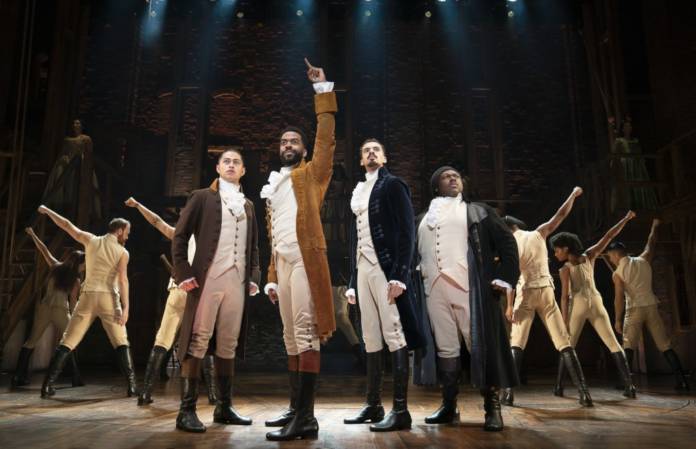ONSTAGE OK, Thomas Jefferson as Slick Rick got me.
Dazzlingly embodied by actor Simon Longnight in the latest touring production of Hamilton to hit SF (through September 8 at SHN Orpheum Theatre), Jefferson is written as an effete elite, a plantation-owning coward who hid out in Paris during the Revolutionary War. Like everyone else in the play, his lines tumble out in a barrage of hip-hop cadences: The choice to have Jefferson sound like one of rap’s original long-form fabulists, with a dose of Shock G’s classic East Bay comedic alter ego Humpty Hump thrown in, is pretty genius, especially given Rick’s foreign origins and Hump’s hilariously pompous self-inflation. (Longnight, who also plays the earthier dandy Marquis de Lafayette, is in possession of the play’s biggest special effect: His hair flips from braids to fade in a matter of moments.)
References such as this pour forth like the characters’ cleverly woven streams of dialogue in the retelling of Alexander Hamilton’s life story: a Mariah Carey trill here, some Public Enemy bluster there. You’ll be hard-pressed to find any musical marker past the mid-’90s heyday of Wu-Tang Clan, though, so we’re firmly in comforting “uncle jams” territory: Audiences don’t need a degree in hip-hopology (or a taste for Lil Peep) to bop along.
Longnight is joined by a polished cast, including Julius Thomas III as the hunky Hamilton, Donald Webber, Jr. as Hamilton’s fatal nemesis Aaron Burr, and Julia K Harriman as generous-hearted wife Eliza Hamilton. The production is a wonder, full of on-a-dime twists, dynamic choreography, and some truly marvelous bits of stage magic—a scene where time is rewound like a record on the actual rotating set is heart-stopping.
Hamilton sweeps us from Alexander’s roots as a Caribbean “bastard” immigrant through the Revolutionary War, the Constitutional Convention, a New York law career, marriage, children, scandal, loss, and death-by-duel (hardly a spoiler). It’s all counterpointed by Burr’s own story, the ambitions, talents, friendship, and eventual jealous enmity of both men intertwined like a thorny bromance. Then comes a sweet twist at the end that shifts the whole perspective of the play, and the tears jump out.
And it remains a stunning thrill to see a stage full of faces of color. Beyond its effectiveness as a theatrical experience, Hamilton‘s famous trick of casting Black and Brown people as the Founding Fathers (and some Mothers) guarantees a welcome break from the sea of white parts the San Francisco theater season usually offers.
So Hamilton lives up to the hype. And yet, at this point in American political history, it’s fair to ask: to what end?
Originally staged on Broadway in 2015 (and germinated in Obama’s White House in 2009), writer/actor Lin Manuel Miranda’s Hamilton is a critic-proof juggernaut, thanks in part to an ecstatic young fanbase (bless them!) of the kind pioneered by Rent. Hamilton, Inc. is a gleaming, steaming machine that manages to be both the hottest bourgeois ticket in town and an Ur-symbol of #resistance. When it debuted, the play was heralded as a crowning moment of the Obama Era—here was a rousing theatrical experience in which people of all colors could see themselves reflected in the birth of United States history, where Black and Brown art forms were finally placed in the firmament of the Great White Way, where the promises of opportunity for all once again ring from the proscenium flagstones.
That seems ridiculously naive right about now, a more radical moment, when tearing down the myths of America, especially its capitalist and racial ones, is far more attractive than pumping them full of multicultural rah-rah. The politics of the play just feel off. Opportunities for retelling American history through a POC lens are squandered. (Contrast Hamilton with Suzan-Lori Parks’ searing Father Comes Home From the Wars, which unspools the Civil War through the story of a Black soldier forced to fight for the Confederacy.) Despite the casting, we are still watching a white man’s story here—literally, since Miranda was inspired by historian Ron Chernow’s biography of Hamilton.
And Miranda manages to bury Black concerns deep. Slavery itself is barely mentioned, but implied in weirdly “cutesy” ways throughout. The Three-Fifths Compromise, the original sin of this country enshrined in its founding document, which Hamilton supported, is completely elided. Instead, a major plot point becomes another compromise, the Compromise of 1790, which resolved Hamilton’s fight for what would become a national bank with Jefferson’s desire for the capitol to be established in the South. This somewhat dramatically overburdened moment is treated to a raunchy burlesque number called “The Room Where It Happened”—Marxist critics should have a field day deconstructing Hamilton‘s eroticization of the site where America embraced central banking.
Just as Obama was said to fulfill the dreams of the 1960s, Hamilton seems like the perfect culmination of a certain dream of the ’90s. I can’t tell you how many smoke-filled Detroit dorm rooms and run-down houses I sat around in with friends back then, plotting how hip-hop could take over the art world. What if we set Shakespeare to rap rhymes? (Hamilton gets a cheeky reference in to Gilbert and Sullivan, its main influence.) What if the Fly Girls where choreographed by Fosse? What if we wrote a whole hip-hopera? What if George Washington were Black?
Miranda made all this happen on the grandest scale through sheer talent and will, and now that’s been done. Unfortunately, Hamilton brings along some ’90s gender and sexual stereotypes with it. Women are approvingly cat-called and sparse; villains are high-voiced, fey men; and King George is basically a somehow gayer Elton John.
Hamilton‘s strange transformation from revolutionary Broadway musical to problematic symbol of neo-liberal imperialism is fascinating. But as an airtight production that whisks you along for two breathless hours, it, like the immigrants it famously lauds (and simplifies), “gets the job done.”
HAMILTON
Through September 8
SHN Orpheum Theatre
Tickets and more info here.






